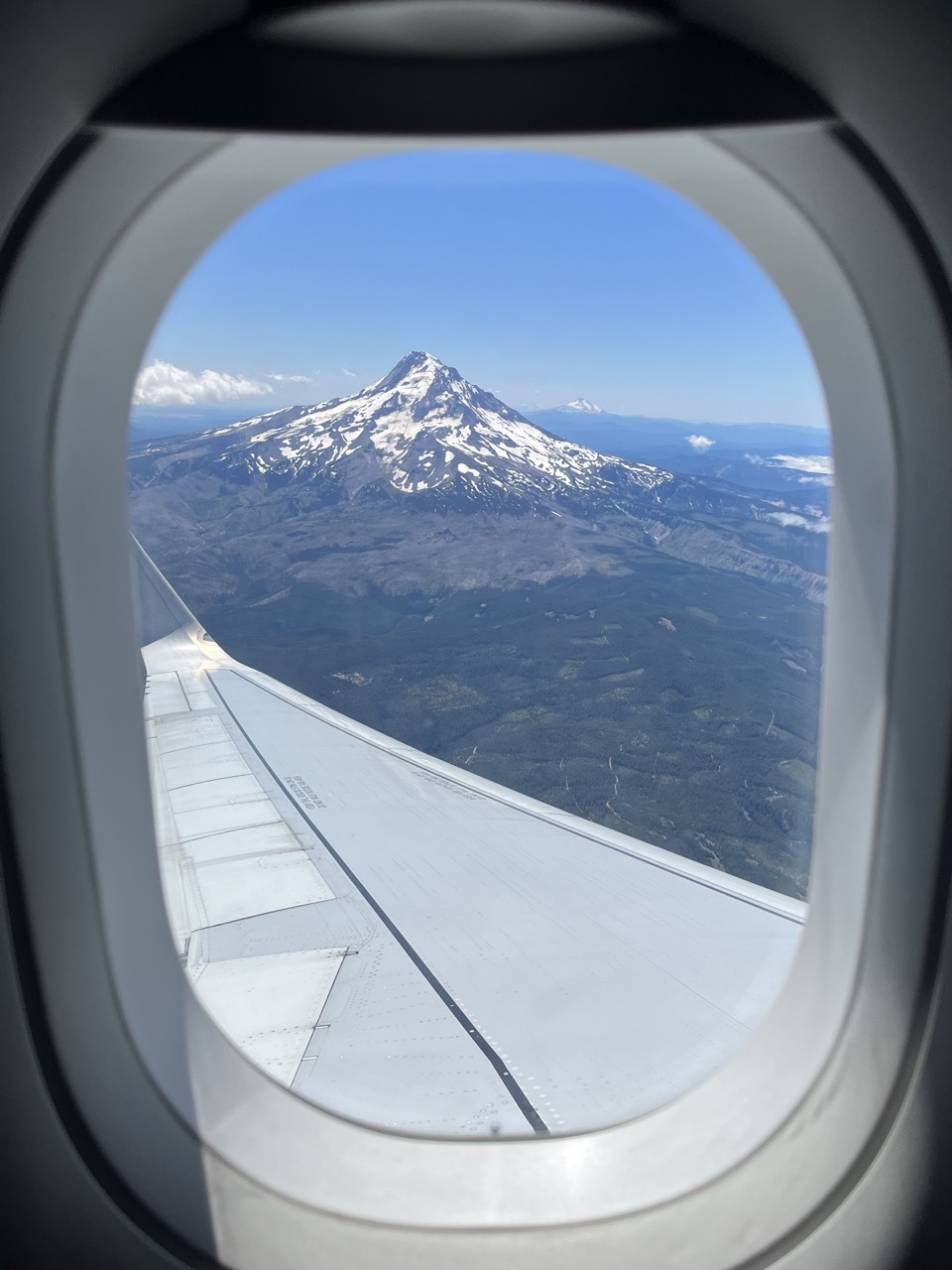Outreachy report #47: July 2023
Two weeks ago, my carer and I were 11,000 kilometers away from home. We visited five different airports (GYN, GRU, DFW, PDX, CGH) to travel to Portland, OR in order to attend the very first FOSSY, our American 1,000 interns celebration, and meet two of the people I’ve been working with for half a decade. I had so many silly questions: Would people be taller or shorter than me? How do they sound when there isn’t a not-so-stable internet connection intermediating our communications? Will they like the gifts I got them?
(I was surprised to learn I’m the tallest!)
Staying at the Hyatt Regency meant that the conference was only a short walk away from us. We entered the Oregon Convention Center at the same time as Monica [Ayhens-Madon]—who was extremely kind since the beginning, thank you!—, and we all were able to orient ourselves as soon as we saw the beautiful FOSSY signage telling us about mask requirements and the location of the registration desk. Getting our badges was easy, and so was connecting to the conference’s WiFi. It was particularly heartwarming to see so many references to Outreachy—I’m so used to attending conferences where I need to spend 5 to 10 minutes explaining what Outreachy it always surprises me when I’m somewhere where this is part of the overall communal body of knowledge.
I would love to say that I watched a lot of talks at FOSSY, but the truth is, I was so busy with preparations for the celebration and the three different activities I was about to facilitate I barely had time to watch more than one talk and a half (“Contributor Growth Strategies for OSS Projects” by Dawn Foster and “Nature adventures with FOSS” by Sage). For future conferences, I think it would be best to be involved with two activities at most, with one of them maybe being more unstructured than the other. I feel like I talked way more than I was able to listen, and that felt like a somewhat wasted opportunity to connect more with other perspectives on free software.
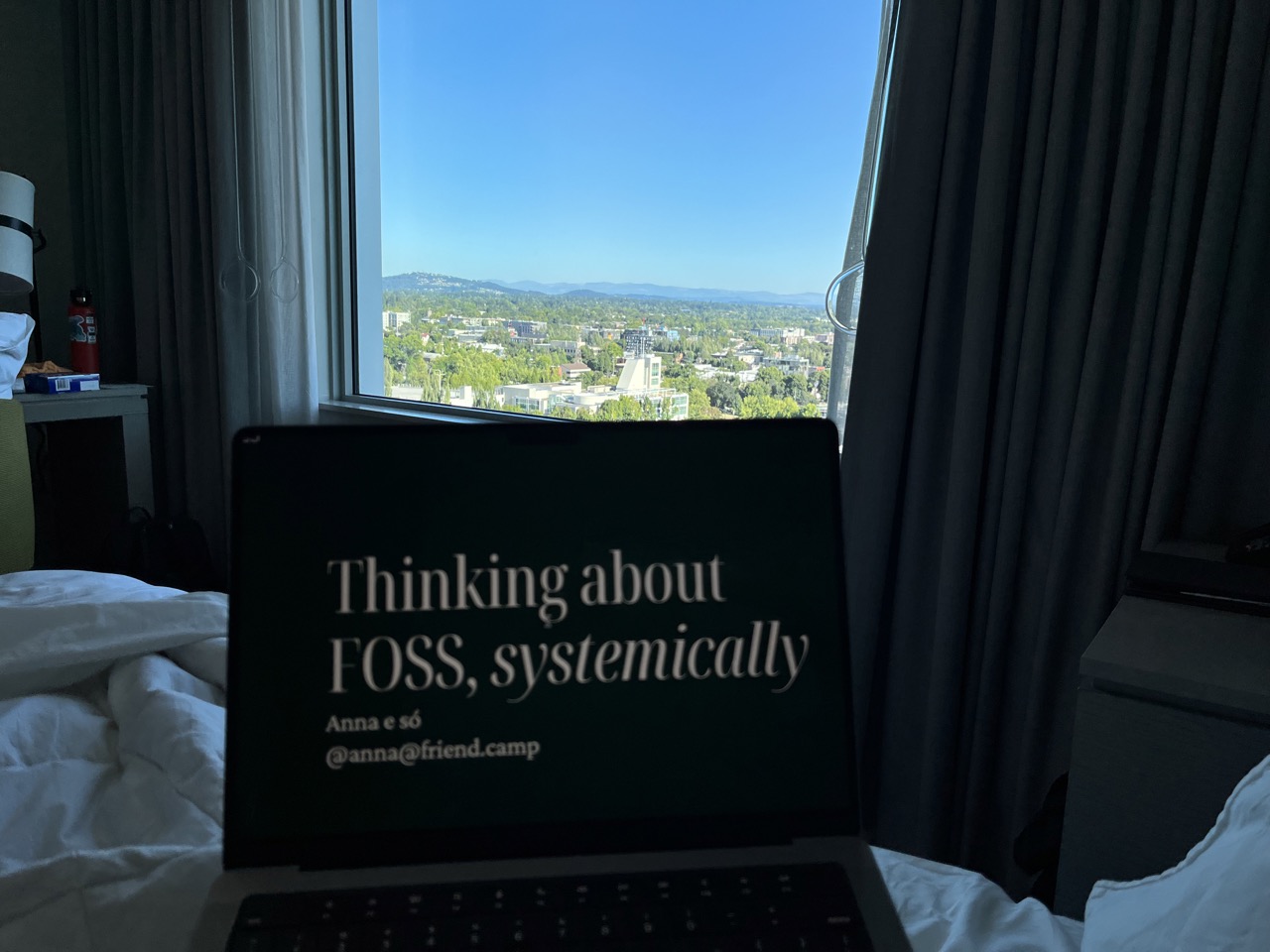
Although I was quite disappointed in my performance as a speaker—at that point, I was so exhausted this trip felt more like a dream than something I was experiencing in reality—, my talk about systems thinking seemed to resonate with a lot of people. I loved how one person in the audience asked if we could have a more unstructured conversation at the end during questions—it helped me understand my audience in a very constructive and collaborative way. To be honest, I’ve always had a preference for more interactive activities since I attended MozFest in 2018, and I was planning on doing something like that after I realized my talk would be shorter than I intended. But seeing that idea come up spontaneously from my audience was magical, and I’m so grateful so many amazing people gathered to listen to what I and others had to say.
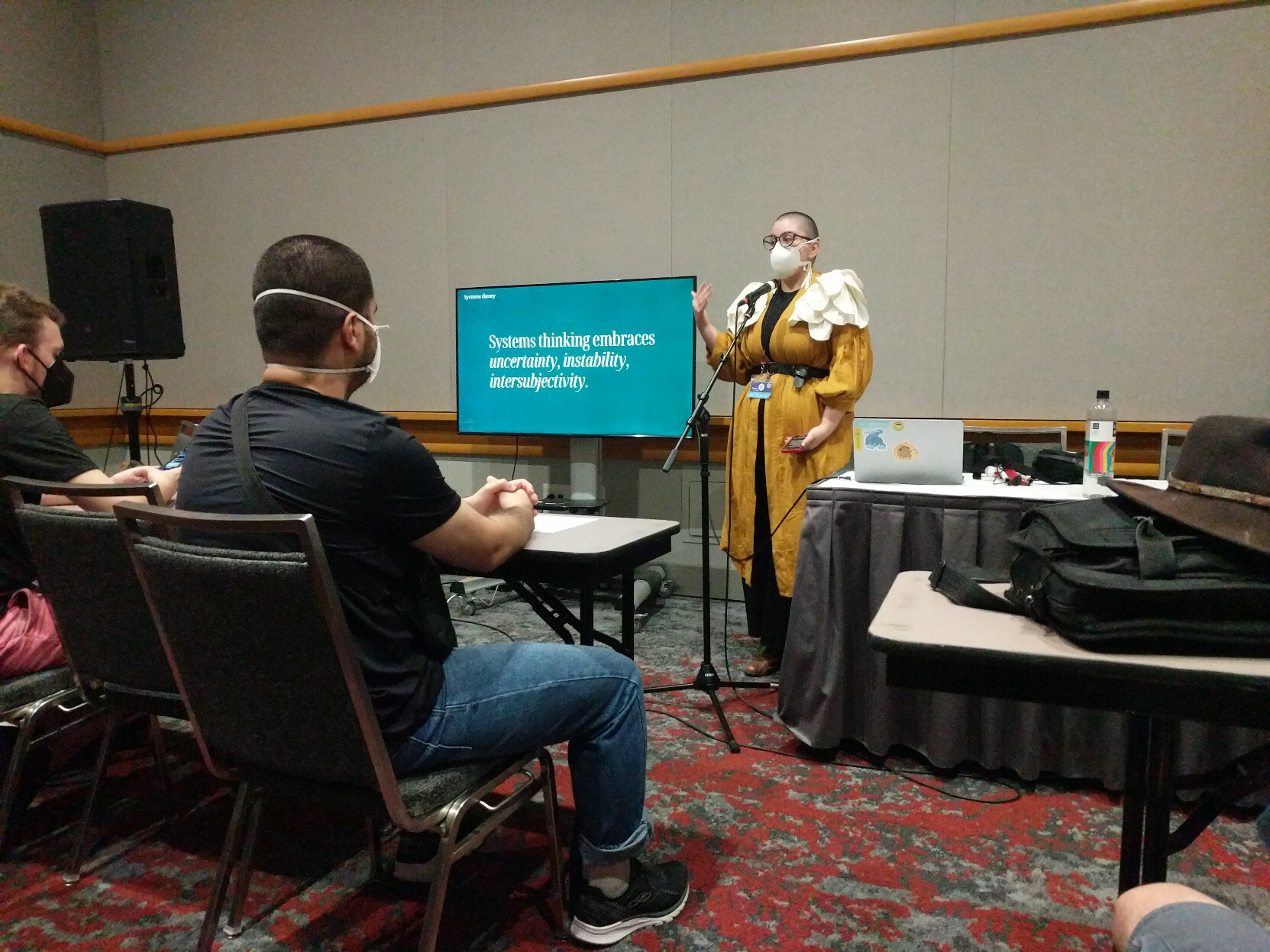
(By the way, every Diversity and Inclusion and FOSS track organizer did such a good job in curating and also welcoming speakers and facilitators. I really felt at home there.)
Our celebration was more of a small gathering than a bigger structured event, but I really appreciated that after a day of overwhelming social interactions. It was awesome to learn about some “Outreachy lore”—including the story behind the celebration sticker—and share a meal with people who have contributed in so many ways to the program that changed my life. It was one of the few amazing meals I had in America, and I believe it was because it was extremely close to what my day-to-day experience as a Latin American looks like: meals are social experiences as much as they are ways to replenish our bodies. We gather to eat and to talk about our days, our lives, our thoughts, our feelings.
I found the keynote to be a tad funny—Sage and Karen are really high energy presentators, and I feel like I’m calmer and more introspective. I’m not going to be as harsh with myself as I was with my talk—it was my first experience of this kind—, but I will say I wish I had more time to plan what I was about to say. But if practice won’t help me achieve perfection, I have hope I’ll at least achieve some improvement.
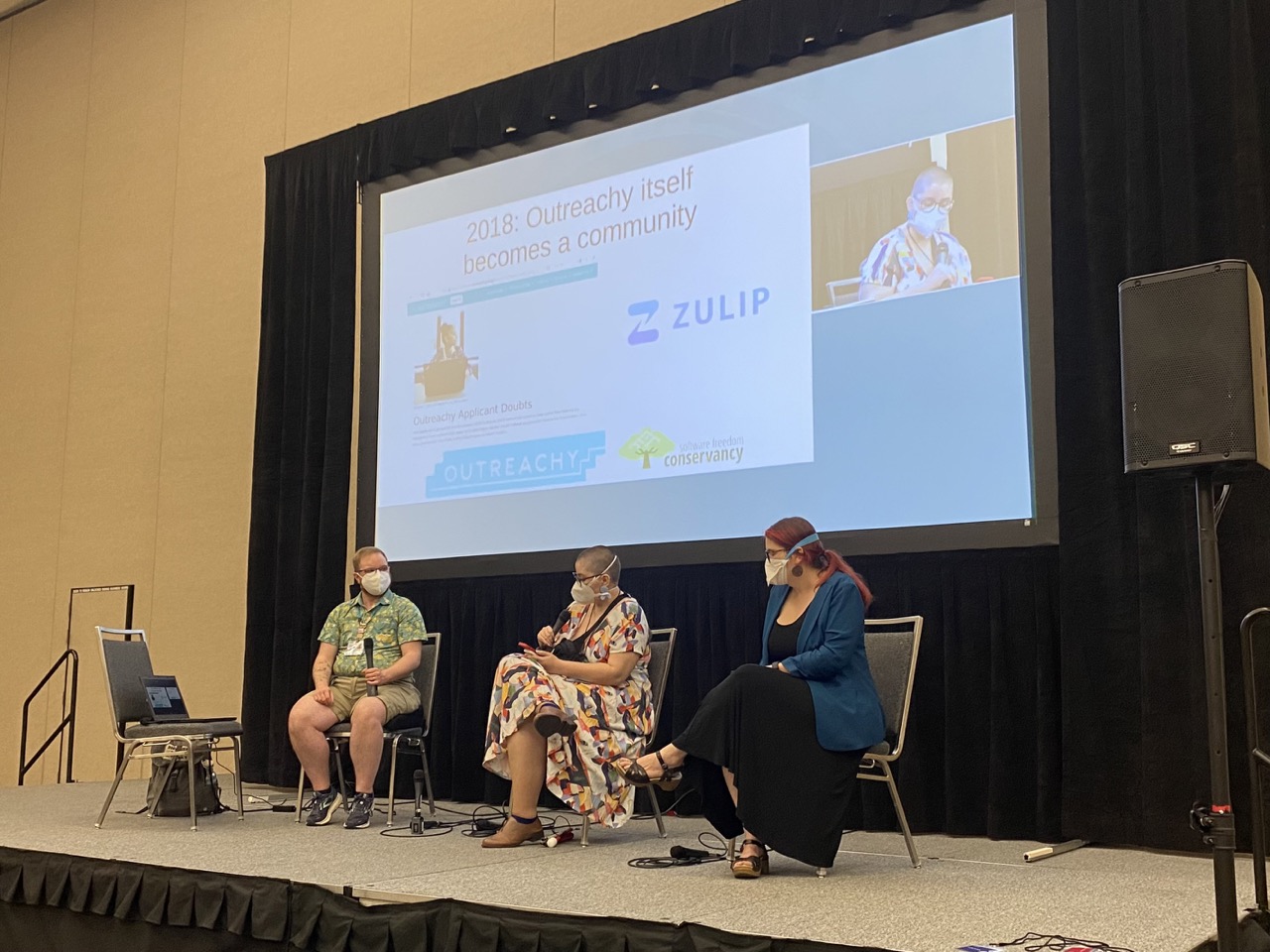
Our mentorship discussion on the same day went well, although it was a somewhat harder to facilitate than CZI’s because some people had completely different goals and perspectives about the meaning of mentorship. This time, I feel like I was able to connect more with people through the worldview of someone who’s been mentored rather than of someone who organizes a mentorship program as many of our attendees were mentors, people who were about to mentor, or people who have been mentored.
Lastly, this wouldn’t be a report written by me if I didn’t mention some of the things that made traveling to a place that far from home more challenging. I actually considered sharing them at my talk about systems thinking, but I scrapped that idea because I wasn’t ready to talk about them publicly.
I didn’t receive any assistance from American airports or airlines even though I requested it in advance. An American Airlines employee did call me a day before our trip to confirm some details and told us we would always have someone waiting for us, but things didn’t happen as we expected—our meet and assist requests weren’t honored, American Airlines employees didn’t seem to be trained to identify white canes (one of them even grabbed mine as I left the plane that took us to Dallas because they “wanted to see it”), and our pre-boarding requests in American soil were completely ignored while traveling to Portland. Pre-boarding requests weren’t ignored while traveling to Dallas and then São Paulo because my spouse strongly advocated for me when talking to American Airlines employees at PDX and DFW.
I’m appalled by the lack of care for disabled passengers in the United States—I had much better experiences in Brazil, Argentina, and the United Kingdom. That’s quite worrying considering that I saw significantly more people using mobility and orientation devices in the US. In all other countries, my spouse and I didn’t have to fight with anyone to get what I needed—every single person defaults to asking me if I need any assistance or if have already requested any, and goes above and beyond to assist me. We were relieved when we finally arrived in São Paulo.
Those situations reinforced the necessity of always having a designated carer traveling with me—I had so many moments during this trip I was so overwhelmed I was approaching non-verbal levels of overstimulation and stress. While some were just bothersome or upsetting, others were significantly dangerous (and might have resulted in my white cane breaking during our trip).
Both my spouse and I couldn’t help but notice a layer of hostility everywhere we went—from people wearing t-shirts with literal hate speech to disapproval looks clocking us as people who didn’t belong. We couldn’t figure out if it kept happening because…
- … we’re easily identifiable as Latinxs;
- … we’re wearing N95 masks;
- … my spouse isn’t white;
- … I’m carrying my white cane.
But that feeling of otherness seemed unescapable, almost suffocating. It was notably worse in Texas, but it followed us to Oregon. It added to the stress of being sleep deprived after traveling for over 24 hours, and no night of sleep was able to help us heal. It culminated in a panic attack during the second day of FOSSY that felt like the world would end at any moment.
I don’t want to let that erase how special it was to have the opportunity to travel to the United States—I’m so grateful I was able to attend FOSSY and meet the 2/3 of Outreachy I’ve been working with for almost half a decade! However, at the same time, I don’t think that the US should be Outreachy’s meeting point, especially as we’re about to have 3/5 of the team located in the Global South—we have to put in a disproportional amount of effort to visit the country, and applying for a B1/B2 visa isn’t advisable if you don’t have an extensive international travel history.
Additionally, I can think of a couple of suggestions to improve FOSSY:
- Decreasing the amount of conference days. Mozilla Festival, one of my favorite in-person conferences, was a 2.5 day event; FOSDEM happens over two days; that recent CZI Science meeting I attended also happened over 2.5 days. 4 days seemed excessive to me.
- Improving FOSSY badges. I found them difficult to read because of their small font and low contrast. It was difficult to figure out why some badges had different colors, too (I suppose they were related to the role someone had in the event, but I wasn’t clear from the beginning). My favorite conference badge is MozFest’s—it allowed us to write anything we wanted (name, organization, fun facts about yourself), they had stickers for pronouns and languages you speak, and on the back they had info about their Code of Conduct enforcement team and food.
- Having a designated quiet room so people can decompress. FOSSY didn’t have one, so my only options were the balconies (too public) or my hotel room (which added to the feeling of isolation and disconnection). And the more I was forced to go to my hotel room to decompress, the less likely I was to return to the conference later.
- Having a portion of the conference that’s open to the public for free and/or affordable to access. CryptoRave, a free conference in São Paulo, usually picks communal spaces to attract newcomers and encourage them to engage with activities concerning privacy and security. Campus Party has an exposition that’s open to the public. Flisol and CryptoRave both have dedicated areas for Install Fests. I missed seeing families, or younger attendees. It felt like FOSSY was too focused on industry professionals and didn’t have much interest in engaging the local Portland community. That seems like a loss—I think it can have both!
- Hosting it somewhere other than OCC. The area lacked good options for food (we had to walk a couple of miles to find more feasible options), and the concurrency with other conferences meant that unmasked people strolled around FOSSY frequently.
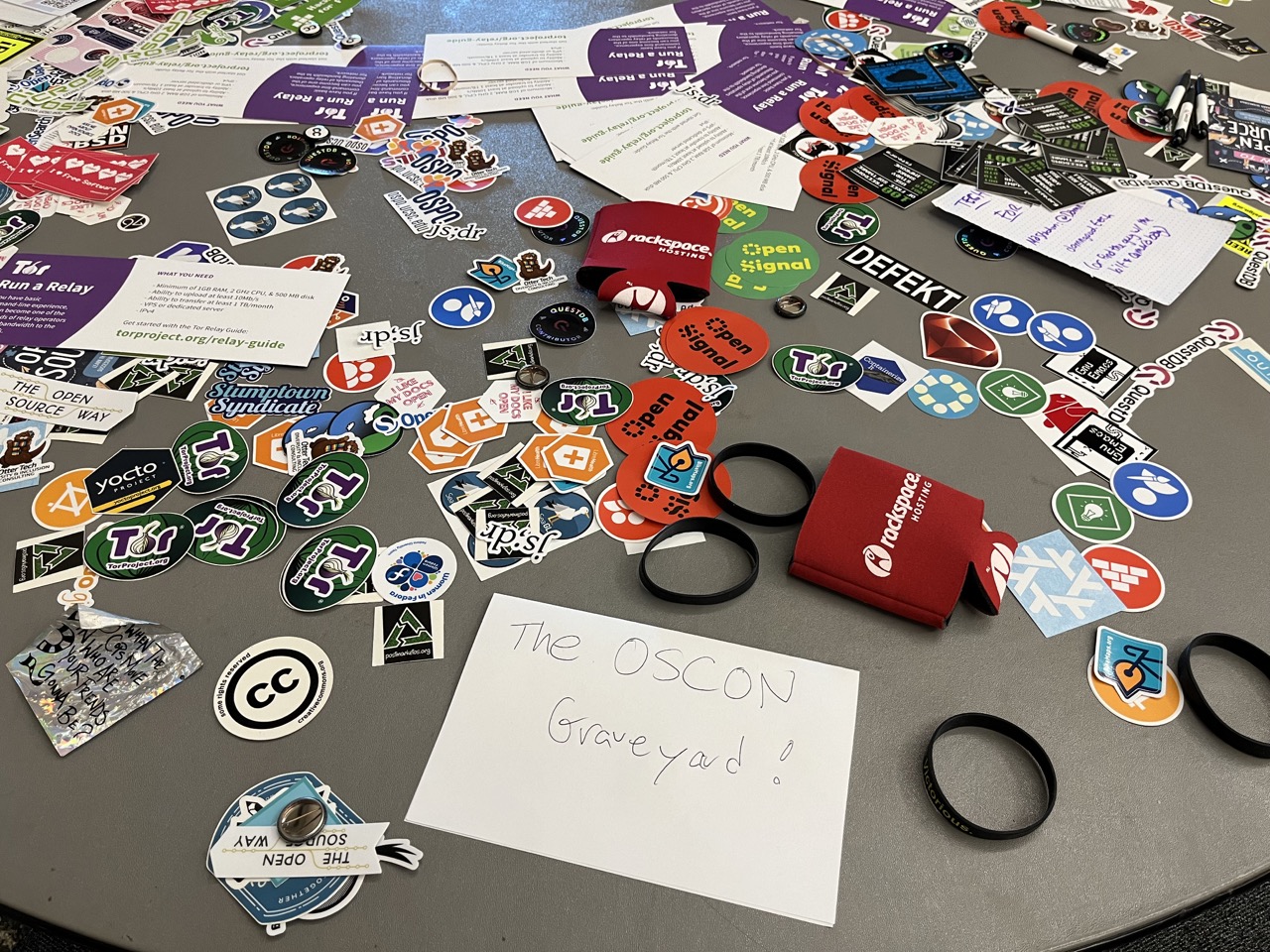
Once again, I’m thankful I was able to attend FOSSY. As a Latin American, the United States always felt more like an imaginary place than something within this realm, and traveling to the US is an immense privilege considering how difficult and expensive it is. What an amazing thing it was to spend time with some of my favorite people, and to experience things a young Anna from a very humble neighborhood would never allow themselves to dream about.
